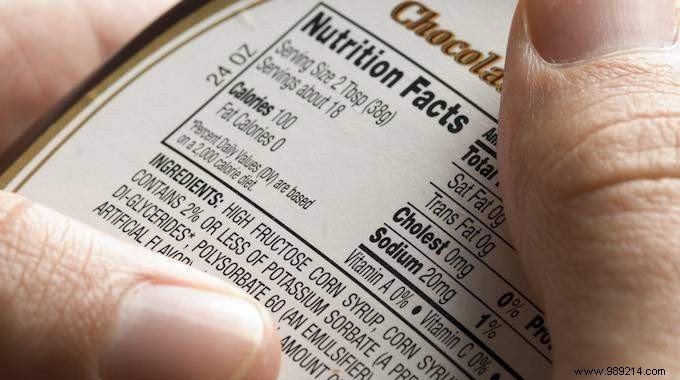
Artificial flavors, colors, preservatives, emulsifiers, sweeteners...
All of these ingredients have invaded our diets for over 40 years.
And I want to say that it sucks, because where did the good taste of the natural go?
Especially when we discover what it causes on our body and on the environment.
Fortunately, there is awareness. We are more and more suspicious.
It is still necessary to recognize where all these toxic products are hiding.
So we decided to make your life easier when you go shopping to decode labels.
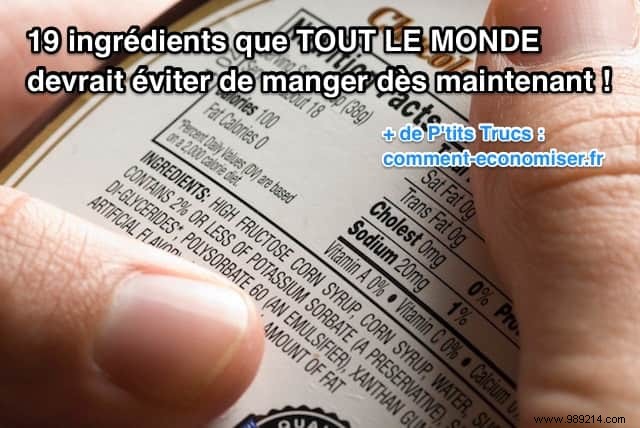
Here are 19 of the most toxic and common additives you should avoid at all costs!
Just one of these ingredients on a label and a wake-up call must be ringing in your head!
This list is far from complete, as there are dozens of other dangerous ingredients, but these are the most commonly used by the food industry. Watch and Memorize:
Artificial flavors are chemicals used to add flavor.
They offer absolutely no nutritional value. In addition, they play the role of a magnet that binds all the other bad products.
They are found everywhere today, including in bread, cereals, flavored yogurts, ready-made soups, or industrial fruit smoothies. It is almost impossible to avoid them.
Each artificial flavor produces harmful effects on health:neurotoxicity, endocrine disruptors or reproduction. They would also promote cancer.
Wheat is one of the seeds that should be avoided. Why ? Because of the many chemical pesticides and fertilizers used to grow it. Not to mention the genetic modifications of certain varieties of wheat...
But the keyword to watch out for is "enriched".
This means that niacin (vitamin B3), thiamin (vitamin B1), riboflavin (vitamin B2), folic acid and iron have been added. But worse, essential nutrients are removed to be able to add others.
It is the same for rye or other cereals.
Enriched flour is refined flour that has added nutrients, but not enough to make it a nutritionally safe product.
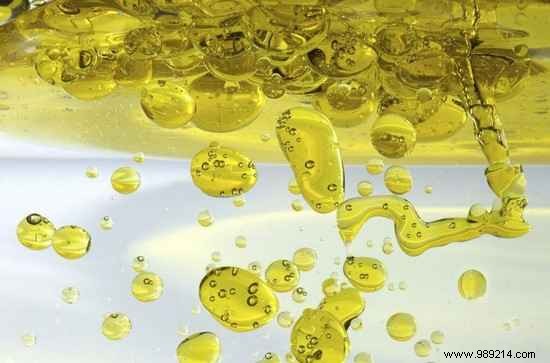
Oil fractionation is a process often used for palm oil. The oil is heated and then rapidly cooled. Under this thermal shock, it is divided into 2 parts:a liquid and a solid.
Then, it is filtered to separate the liquid part from the solid part. In the solid part, there is only a high concentration of unhealthy fats that are terribly toxic for human consumption... and that's the one we use. Yuck!
Naturally healthy oils like palm, soy, corn oil, canola oil or coconut oil are heated to 500 or 1000 degrees. All enzymatic activity is then neutralized. They become a kind of viscous plastic that is introduced into food as a preservative.
We see the word "hydrogenated" on many of the ingredient lists of our products, so beware!
MSG (or E621) is a food additive, more precisely a flavor enhancer that stimulates the taste buds and makes you want to take it again.
It is a slow poison that hides behind dozens of other additives like natural flavor, yeast extract, autolyzed yeast extract, disodium guanylate (E627), disodium inosinate (E631), caseinate, textured protein, hydrolyzed pea protein and many more.
Currently, labeling standards do not require MSG to be listed as an ingredient in thousands of foods.
MSG is NOT a nutrient, vitamin or mineral and has NO health benefits. The part of MSG that is harmful to the human body is "glutamate", not sodium.
The glutamic acid contained in certain foods (corn, molasses, wheat) is broken down by various processes (hydrolysis, autolysis, modification or fermentation with other chemicals, bacteria or enzymes). When refined, it looks like a white crystal like sugar.
More and more clinicians and scientists are convinced that the excitotoxins contained in MSG play an essential role in the development of several neurological disorders:migraines, seizures or epilepsy, infections, abnormal development of neurons.
But also in certain endocrine disorders, and especially in neurodegenerative diseases such as:multiple sclerosis, Parkinson's disease, Alzheimer's disease, Huntington's disease, or cerebellar degeneration. It is also the cause of certain specific types of obesity.
It is found in many prepared dishes, ready-made soups or sauces, certain brands of vacuum-packed charcuterie, certain biscuits, crisps...

The main source of calories comes from sugar. Sugar is in your soft drinks, fruit juices, sports drinks.
It is hidden in almost all processed foods:Bolognese sauce, Worcestershire sauce, pretzels, cheese spread.
And now, most infant formulas have the sugar equivalent of a can of Coca-Cola. This way babies are literally poisoned from day one if you feed them this way.
Sugar alters metabolism, raises blood pressure, severely impairs hormone function, and causes significant liver damage – the least understood of sugar-related damage. These health risks largely resemble the effects of excessive alcohol consumption. Alcohol that partly contains sugar too.
If it's not a naturally occurring sugar, it shouldn't be part of your diet.
To discover: 3 Substitutes to Replace Sugar and Protect Your Health.
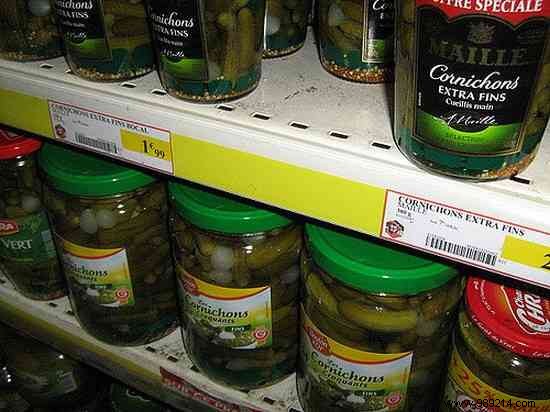
Sodium benzoate (E211) is a preservative. But it can turn into deadly carcinogenic poison when combined with ascorbic acid.
Professor Peter Piper, a professor of molecular biology and biotechnology, tested its impact. What he found is quite chilling. "Benzoate damages an important part of DNA within cells called mitochondria.
These chemicals cause severe damage that renders the mitochondria inactive. And when we know that this part of the cell is its active center... we can fear the worst".
Potassium benzoate (E212) is often present in foods you least suspect:cider, low-fat dressings, syrups, jams, olives and pickles. It is just as dangerous as sodium benzoate.

The food colorings present in our food are often criticized by oncologists.
Blue in beverages, candies, baked goods and pet food causes many cancers in mice.
Red, used to color cherries, fruit cocktails, candies and some baked goods, is known to cause thyroid tumors in rats.
Green, added to sweets and drinks, is linked to bladder cancer.
The yolk, which is widely used, is added to drinks, sausages, gelatin, baked goods and candy, is linked to tumors of the adrenal gland and kidney.
Acesulfame-K (E950), also known as acesulfame potassium, is one of the most widely used food additives to sweeten food and drink. It sweetens up to 200 times more than conventional sugar.
It is approved by the FDA, but it has quite a few negative consequences when consumed. Even though there are many studies that attest to its safety, acesulfame potassium is still suspected of causing benign thyroid tumors.
In rats, the development of these tumors is observed in just 3 months, if the dose of this additive in its food is only increased by 1 to 5%. The period is quite short, so the substance is considered to have noticeable and rapid carcinogenic properties.
Methylene chloride, a solvent used in the manufacture of acesulfame potassium, is believed to be the offending substance.
Sucralose is simply one of the most widely used sweeteners. We know it if we consume Canderel products for example. Its sweetening power is 600 times greater than normal sugar and above all it would not make you fat, hence its use almost everywhere.
It is made up of chlorocarbons. What is a chlorocarbon? It's "simply" made up of carbon tetrachloride, trichloroethylene and methylene chloride, a deadly combination!
Chlorine is one of nature's most powerful chemicals. It is a very fierce, highly active chemical element, used in particular in bleach, disinfectants, insecticides, mustard gas and hydrochloric acid. Do you really want to eat this?
Chlorocarbons are not compatible with healthy nutrition or with our metabolism.
Sucralose is a very common additive in protein mixes and in drinks, especially so-called "zero calorie" drinks, so beware and read the labels! And above all, avoid adding it yourself to your drinks.
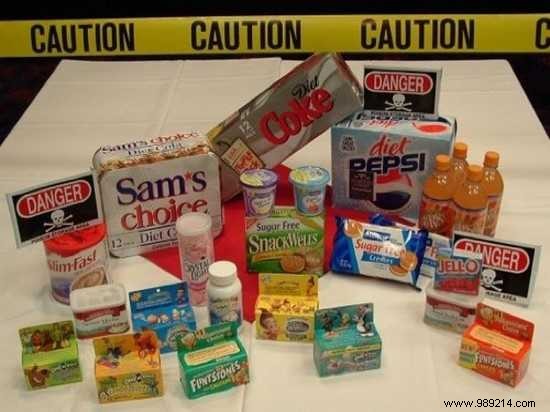
Aspartame is only four calories per gram. But 200 times sweeter than conventional sugar.
It is sold under the brand names NutraSweet or Canderel. But it is also present in many common products, and even in diet products!
The results of a study indicate that aspartame is a potential multiple carcinogen. Even consumed daily in low doses, it is still dangerous.
This is a good reason never to buy certain big brands of candy, for example (Stimorol, Hollywood Light or Ricola).
For a more complete list of products to avoid, click on this link.
Butylated hydroxyanisole (BHA) and butylated hydrozyttoluene (BHT) are used to preserve common household foods. They are known by the acronyms:E320 and E322.
All processed foods that have a long shelf life are often full of BHA.
They are found in cereals, chewing gum, potato chips and vegetable oils, animal feed.
They are oxidants, which form potentially carcinogenic reactions in your body.
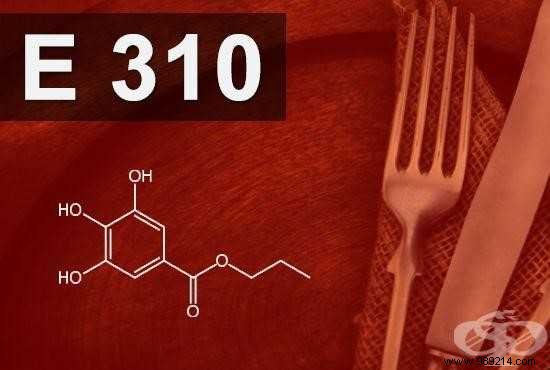
Here is another preservative (E310), often used in conjunction with BHA and BHT.
It is sometimes found in meat products, chicken bouillon cubes and chewing gum.
Some animal studies have suggested it may be linked to cancer, allergies and hyperactivity in children.
A pinch of sodium chloride, more commonly known as salt, is the culprit pointed out by the media and medical institutions. We should avoid it as much as possible.
They are right, because there is a difference between table salt and sea salt. Regular table salt (sodium chloride) has almost nothing in common with traditional, natural sea salt, for example, because it has been refined.
If you see sodium chloride on a label, avoid that food. Especially since some companies excessively salt their prepared meals.
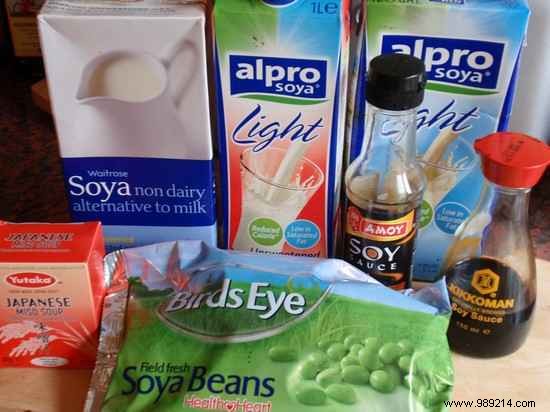
Although it is often hailed as a healthy, cholesterol-free, inexpensive, low-fat protein food, and alternative to meat, soy is not such a healthy food.
All foods that contain soy in their ingredient list, in any form, should be avoided.
Soy protein, isolated soy and soybean oil are present in approximately 60% of foods on the market. They are accused of impairing fertility and affecting estrogen in women.
But it would also be responsible for a lower libido and trigger precocious puberty in children. Soy can also add an imbalance of omega-6, omega-3 and other fatty acids.
The only soy products fit for human consumption are fermented and organic and I guarantee you will never find them in processed foods.
Also, the majority of soy used in processed foods is GMO and you can't get around that.
The word "soy" is one of my "barometers" to assess a person's diet. When I think that health professionals and naturopaths still recommend soy as a healthy food, I feel like screaming!
Please don't touch that stuff.

We've come to a point that all corn products, including fresh corn, should be avoided.
The percentage of genetically modified corn is HUGE.
You will never know if you are consuming organic corn, modified corn starch, dextrose, maltodextrin and corn oil, all of which should be avoided.
All are high in omega-6 fatty acids, which can promote inflammation, cancer, and heart disease.
Your body needs two fatty acids:omega-3 and omega-6 fatty acids to be at its best.
Most experts recommend having an equal ratio between the two types of omega. Unfortunately, most consumers in industrialized countries consume about 15 to 20 times more omega-6 than omega-3.
It is one of the most used preservatives in the food industry. It is almost impossible to find an ice cream without potassium sorbate (E200, E202).
Not only is it recommended to avoid this chemical, but it is also a necessity to eliminate it altogether.
The food industry and the scientists who work for it endlessly claim that potassium sorbate is not a health threat. The proof?
It has a normal safety record and a non-toxic profile. Well let's see! Watch this study, but stay seated before reading it;)
Food and chemical toxicology reports have listed potassium sorbate as a carcinogen. It causes mammalian cell mutation.
Other studies have shown broad toxic and functional effects on non-reproductive organs of animals.
No long-term studies have ever been done on animals or humans, so there just isn't enough evidence to show what might happen after years of ingestion.
However, on the basis of the short-term carcinogenic and toxic effects, should we really doubt the long-term consequences?
Soy lecithin has been used in our food for over a century. It is an ingredient found in hundreds of processed foods. It is also sold as a food supplement in the health section.
However, most people don't realize what soy lecithin is. And above all why the dangers of ingesting this additive far outweigh its benefits.
Crude soybean oil goes through a "degumming or refining" process, what remains after this process is soy lecithin. It is therefore a product made from soybean waste which contains the most solvents and pesticides.
Another major problem associated with soy lecithin stems from the origin of the soy itself, which is 99% GMO.
This emulsifier is found in ice cream, chocolate and many dessert creams.
Polysorbate 80 (E433) is an emulsifier that has the particularity of being a water-soluble oil.
It negatively affects the immune system and causes severe anaphylactic shock or severe allergic reactions.
In the United States, the "Food and Chemical Toxicology" research center has shown that polysorbate 80 causes infertility, that it accelerates aging, that it causes changes in the vaginal mucosa and uterus, hormonal changes, ovarian malformations and degenerate follicles.
What is very suspicious about this ingredient is its addition in cosmetics and vaccines. Scientists are obviously aware that it can cause infertility, but we keep seeing it appear.
You'll also commonly find it in kids' favorite ice cream and most McDonald's products.
Canola or rapeseed oil is toxic to living beings. It is also an excellent insect repellent.
It is an industrial oil that comes from an intensively cultivated genetically modified plant.
The Canadian government and the food industry paid $50 million to get canola oil placed on the "Generally Recognized As Safe" list. Enough to install doubt...
Although it is becoming increasingly difficult to find products that do not contain canola/rapeseed oil, avoid these products as much as possible.